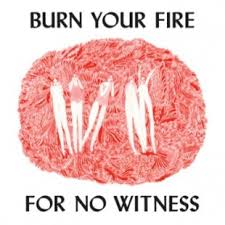As a title, Burn Your Fire For No Witness might on reflection essentially carry no more weight than something like Feel The Fear And Do It Anyway, but Angel Olsen has developed a way of delivering such sentiments that is anything but trite. Since her last album Half Way Home was released a little over a year ago, Olsen seems to have settled in to a commendable niche, with its follow up building on the ground there laid not only in terms of the additional instrumentation, but in the way her ideas are delivered in a manner that’s now bracingly to the point.
In one respect, Olsen might have more to hide behind on Burn Your Fire, with this being the first record she’s ever made with a full band. But drummer Josh Jaeger and guitarist Stewart Bronough are delicate, sympathetic players who amplify little other than the character of the songwriter. Though it’s largely devoid of the vocal idiosyncrasies that put off a few less hardy listeners in the past, this is a record that drips with personality.
Olsen has riled against over analysis of her lyrics, claiming their meaning can shift even for her over time. But if one theme can be drawn from her latest work, it’s one of resilience, defiance in the face of… well, what have you got? Even if Olsen hasn’t defeated loneliness, death or lost love, they certainly seem like issues with which she’s making her peace.
For the most part, it’s an album of two distinct kinds of song – quiet ones and louder ones, with the former very rarely morphing in to the latter. It’s that second category that’s initially the most eyebrow-raising, with songs like ‘Forgiven/Forgotten’ displaying a grungier quality than any of her previous work, a forceful, In Utero-like bite that stops her forlorn tale of a someone who’s "so close, but not with me" from doing any wallowing. It’s bettered by the remarkable ‘High Five’, which comes across like a crunchy country song given a lo-fi, psychedelic twist and could be the work of an angrier Nina Nastasia. It has a way of making major chords sound devoid of any joy, but a sardonic sense of humour ("Are you lonely too?", she asks, replying "Hi-five, so am I!") that carries the whole thing through without so much as a grumble.
Though it’s fantastic to hear Olsen flexing her compositional muscles in such a manner, it’s more of a thrill than ever to hear her strip things back, as there’s been significant ground gained in her songwriting in this respect, too. On ‘Enemy’ she sings of how "You could be the only one who knows the truth of me", accompanied by anything but her own guitar, in perhaps the most direct moment in a record that never beats around the bush – it’s very much like you’re being made privy to a secret. It’s sister of a song, sonically at least, is found in ‘White Fire’, which has a fascinating atmosphere about its seven minutes that’s not unlike the numbness brought on by a good hour’s sobbing.
Though it’s true that the moments when Burn Your Fire grows from hushed confessionals to grandiose cacophonies in the space of a single song are few and far between, when they do arrive, they’re outstanding. They’re hinted at in the guttural guitars and drums that sound like they’re being played in a cathedral on ‘Dance Slow Decades’, but you’re made to wait right till closing time for the pay off. It arrives in the form of ‘Windows’, which from characteristically sparse beginnings transforms in to a sort of desolate power ballad (all hinging on the lyric "Won’t you open a window some time? What’s so wrong with the light?") that displays a mastery of the art of restraint and release with which modern post rock would do well to reconnect. It might only go on for a minute or so at the record’s close, but thanks to the wait, it hits like a truck.
Progression is a great thing to hear in any artist’s work, and there’s plenty of that to the largely excellent Burn Your Fire. Yet its louder moments at the minute seem mostly in place to provide contrast, with Olsen remaining at her most engaging when speaking to you in whispers. If she can channel some of the intensity of those passages in to her heavier sections, her music could transform from something you root for in the face of life’s woes, to a sound that fears nothing.


